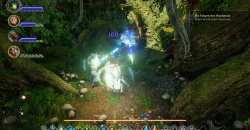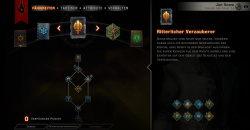Developer/Publisher: BioWare/Electronic Arts
Release Date(s): Nov. 18, 2014 (North America, Russia), Nov. 20, 2014 (Australia), Nov. 21, 2014 (Europe, South Africa), Nov. 27, 2014 (Japan)
Genre(s): Action RPG
Platform(s): Windows, Playstation 3, Playstation 4, Xbox 360, Xbox One
Language(s): English, German, Spanish, French, Italian, Russian, Polish
Pricing: $59.99 USD / €59,99 EUR / £49.99 GBP
Rating: M (ESRB), 18 (PEGI), 16 (USK), MA15+ (ACB)
BioWare exceeded all expectations back in 2009 with their epic RPG Dragon Age: Origins, leaving many fans to wonder if they’d ever be able to top it. Its designated successor, Dragon Age II, was criticized for being too focused on action, and not giving as much attention to detail as its predecessor did. The current title, Dragon Age: Inquisition promises a return to the series’ roots. Read our review to find out if BioWare has lived up to their promise, and what’s in the game that should revive RPG fans' flagging spirits.
The sky is falling
The storyline of Dragon Age: Inquisition contains all the necessary ingredients for the creation of a popular fantasy series. An unassuming protagonist stumbles into a catastrophic event that obliterates the assembled forces of good, and as the only survivor, he’s made a scapegoat by those who were not present. The only thing that will end up saving him from the gallows is a curious mark on the palm of his hand. But the mysterious evil forces behind the disaster are not yet finished – suddenly, a sickly green rift rips the sky apart, spewing forth demons into the world.
The branded hero is given “enhanced interrogation techniques” to force him to confess to his misdeeds and bring this unfortunate episode to a close. Rightfully so, the innocent protagonist is utterly bewildered by this line of questioning, not least because he’s suffering from amnesia in the wake of the catastrophe. An Elven mage with dubious motives steps in at last to intercede for the hero. Together with a zealous warrior and a charming rogue, who you might recognize from Dragon Age II, the protagonist organizes an expedition to the mountaintop beneath the Breach in the sky, which he intends to close with the aid of the magical symbol on his hand.
Of course, the whole endeavor is based on the assumption that the hero really will be able to do something to stop the demonic invasion. He’s able to provide evidence for this pretty early on, as several smaller rifts open up in the area unleashing hordes of the deadly fiends upon the hero and his party. Fortunately, the mark on the hero’s hand really does endow him with the power to close these rifts between this world and the Fade. Otherwise, the constant attacks by the disembodied forces of evil would swiftly bring an end to the adventure. Single-minded in their sense of purpose, the group sets off to destroy the apparent source of the chaos that is consuming the land. But at this point one might suspect that this is really just the beginning of the story, as there are still so many questions left unanswered. What caused the Breach? Who was behind the sudden attack on the forces of good? But more than anything else, what is to become of the hero once he’s completed the task he’s been given?
Nuts and bolts
Before we were able to really start testing Dragon Age: Inquisition in detail, we ran across the first few problems with the game. While the download (via Origin) and installation went off without a hitch, the program crashed after we created our character, without giving us any kind of error message explaining what happened. Given that the hardware drivers on the test computer are kept as up-to-date as they can be, and given that we made sure to reinstall EA’s DRM software just for this title, it was pretty clear where the problem lay – with the Dragon Age servers, which caved under the onslaught of players trying to play the game they bought, and were now working at a very limited capacity. You see, when you launch Dragon Age: Inquisition, the game tries to generate a world based on data from the “Dragon Age Keep”, a new online platform that can take your saved games from Dragon Age: Origins and Dragon Age II and use them to influence your game in Inquisition in a way that reflects the previous decisions you made in the Dragon Age universe. Or, if you’re a registered Origin user, you can put together a back-story using a browser-based interface that has you click through several decision threads, which will then be applied to your game in Inquisition. It’s just annoying when the game tries to load the data from these sources and they’re not there, which causes the program to crash with no reason given, like nothing happened.
Once we managed to stop the program from trying to use data from Dragon Age Keep and adjusted the settings to curtail Origin’s insatiable lust for data, we were finally able to embark on our long-awaited adventure. The first order of business is to create a character, and Dragon Age: Inquisition features an extensive and detailed character editor to help you customize the hero of this latest installment in the series. You can choose from one of four races: Humans, Elves, Dwarves, and Qunari. Each of them has certain bonuses, though they don’t really affect the course of the game all that much. Much more decisive will be your choice of one of three classes – Warrior, Rogue, or Mage – which will affect your abilities and your attributes as well as the kinds of weapons and gear you can use. Later you will also have the opportunity to choose an advanced specialization, which will unlock additional skills. A Mage, for example, can master both elemental and protective magic, but a sufficiently advanced Mage can become a Knight Enchanter, a Necromancer, or a Rift Mage.
Typical for the genre, the protagonist is a nobody who will have to grow into their role as the Chosen One. You gain experience points by killing enemies and completing missions, and when you get enough of them, your whole party can level up. You gain one skill point each time you level up, which distribute along the game’s clearly arranged skill tree to unlock new skills or passive bonuses. These passive bonuses include increases in various attributes relevant to each class. Rare items can also alter your character’s skills and attributes as long as you have them equipped. You’re free to try out all your options, since no decision you make here is really permanent. If you feel like you made the bad choice somewhere along the way, you can go to the local blacksmith and pay him a few hundred gold coins for a useful amulet that lets you reset all of a particular character’s skills.
In the course of the adventure the hero will come across several additional characters who will want to join them in their quest. However, only three companions at a time can play an active role in the hero’s party, while the rest of them will have to wait back at your base of operations. Conveniently, every character gets a skill point when your party levels up, so you don’t have to painstakingly keep switching out your companions to make sure they’re all evenly trained. If you want to be able to consistently win battles, you should make sure to keep your party well balanced. A Warrior will attract the attention of enemies and use heavy armor to absorb their attacks; a Rogue will use their bow to rain death on the bad guys from a safe distance; ideally, two Mages will share the task of casting protective barriers on their friends and dealing area damage to their foes. If the two mages specialize in different fields – fire and ice, for instance – you can achieve some pretty devastating combos that wipe out enemies within seconds. To make sure your party isn’t completely invincible, no class, whether they use mana or stamina, is able to cast healing effects, and you will have to rely on a limited number of healing potions. Mages can, however, use the Revive spell to get their companions back on their feet.
Later in the game, the hero will gain influence for his organization, allowing you access to helpful bonuses, such as lower prices from merchants, and useful tools for your Rogue, allowing them to open locked doors. Since the world in Dragon Age: Inquisition is constructed in a modular fashion, “power” acts as a currency of sorts that allows you to unlock new areas and the missions they offer. The protagonist can gain more power through political savvy, by slaying vile creatures, or simply by supporting your allies with resources. Fortunately, the hero and his companions are not alone in their quest to save the world. You will also have three loyal advisors to assist you in navigating the rocky shoals of politics. The strategy table allows you to delegate annoying tasks like tracking down spies to your able companions, where you just have to wait for a little for the mission to be completed. Some missions only take ten minutes, whereas others can take hours.
In addition to combat, Dragon Age: Inquisition offers tons of dialog options that can have a major influence on how the game plays out. In some cases, you can even avoid difficult boss fights altogether by showing the enemy the error of their ways. This is the kind of stuff a good role-playing game is made of! Nevertheless, this great concept isn’t always implemented as well as it could be, and many different decisions or discussions will have the same result. Another thing that the game could be criticized for is the huge degree of sexual license BioWare has put into their latest creation. In Origins, a homosexual relationship with a companion of the same sex still had the potential to be unusual and even scandalous, but in Inquisition, they’re pretty much the thing to do. Just about any NPC can be seduced by the protagonist with the right dialogue options, and they all take it really well. You kind of get the feeling that BioWare is jumping on the bandwagon and programming political correctness into everything, even where it makes no sense.
One more point of criticism is the fact that the developers seem to have focused too much on quests that have you collect things in order to gain access to raw materials and unique artifacts. You can’t take more than a few steps in Dragon Age: Inquisition without stumbling across a puzzle piece, a book, a magical shard, or whatever that starts a tedious gathering quest that has you going all over the map, as if you didn’t have enough to do already. There’s landmarks to discover, raw materials to mine, herbs to gather, wild animals to hunt, and puzzles to solve. For players who don’t consider the game finished until they’ve explored every nook and cranny of the map, this game can be a total nightmare. You have to invest so much sheer time and energy to complete every little mini-quest, and only rarely does it ever end up being worth the effort. A little less focus on searching for things and a little more on cool puzzles couldn’t have hurt.
The inventory system in Dragon Age: Inquisition is pretty extensive, yet at the same time it limits you to a maximum of 90 objects, regardless of how much they actually weigh. Since there are tons of armor and special items in the game, you have to constantly ensure that the members of your party are equipped with nothing but the best. You’re just going to have to sell the rest, as there’s ironically nowhere for you to store anything – not even in your own castle. Fortunately the raw materials you use to craft items don’t count towards your inventory limit, which makes a lot of sense, given the massive amounts of ores, herbs, leather, and textiles you’ll be lugging around. With hard some work, some valuable resources, and some rare schematics, you should be able to create your own gear with even better stats than the unique items dropped by powerful enemies after they suffer a violent death at the hands of you and your party. On the other hand, many weapons you can create yourself tend to be of average quality, and usually aren’t worth the trouble.
Herbs are only really all that important at the beginning of the game, as they help to optimize the effects of various potions. Healing potions will generate more HP, grenades will cause more damage, and tonics will be more effective. But once you’ve unlocked all the upgrades at the alchemist’s, you won’t need to go around collecting rare plants; instead, you can brew potions using nothing more than the common grasses that seem to sprout up over the place like weeds. Mounts in Dragon Age: Inquisition are pretty much useless – they’re nice to look at, and they do get you across the map faster, but in practice using them can cause you to miss out on valuable resources or lucrative treasures. On top of that, they’ll throw the hero from their backs at the slightest hint of danger. And once you have your own camps in every part of the map, you can just fast travel between them anyway.
Finally, Dragon Age: Inquisition features a multiplayer mode that exists completely independently of the single-player game. You create an online avatar, and then you embark on cooperative or competitive adventures with other players, most of which come down to down-and-dirty combat. You’re rewarded with points you can use to optimize your character’s skills and equipment. You can also unlock additional classes and use them to continue fighting online. The whole thing comes off as a bit too commercial; for example, BioWare its valued customers the chance to make microtransactions to purchase chests full of valuable items and equipment.
Mission control
The controls in Dragon Age: Inquisition are designed in such a way that they work well with either a controller or with a mouse and keyboard combination. You automatically lock on to enemies and objects, doing away with the need to manually target everything. At the beginning of the game, various explanations will pop up on the screen to explain the game’s interface. But lots of things are intuitive, and you should be familiar with them from other titles. One thing that’s missing, however, is an additional skill bar for Mages, as the eight buttons available just aren’t enough to hold all the useful spells. Of course, they might have done this on purpose to prevent magic-using characters from mutating into unbeatable demigods who have no trouble taking down a dragon all by themselves. Although you can control each party member individually, you can just as easily focus on the main character and let the computer control your companions. The artificial intelligence in Inquisition lives up to its name (finally), so that your brave adventurers will support one another in battle without you having to worry much about their well-being.
Looks good, sounds good
When it come to graphics and sound in Dragon Age: Inquisition, BioWare once again proves itself worthy of its reputation. All of the cut scenes are perfectly synchronized – the voice actors are very believable in their roles, and the environment is magnificent. Everything is amazing to look at, from wild, green forests to punishing desert environments. All the controllable characters look really unique, and the only NPCs with twins all over the place are unimportant ones like soldiers and guards. The orchestral background music is good enough to listen to on its own. More like it, please!
























please send the key to my email
Key please, thanks:
Please give a key...
THANKS! :D
Would you please send a key to me? :)
key pleas
asd
sa